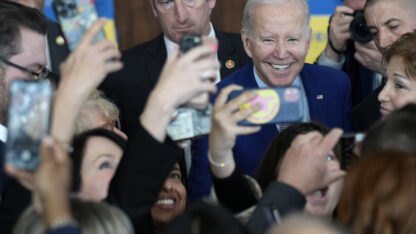But some trans advocates are concerned that for students in high school and at the college level, the proposed rule also would allow some restrictions to be levied, as long as those restrictions are not due to a student identifying as transgender. Schools could limit trans athletes from taking part in particular sports and at specific grade levels, if the school can show it has a particular need to do so and takes steps to minimize harms caused to anyone excluded.
Others argue that the language provides a legal framework for transgender students if they need to challenge a restriction on their participation, and that any type of restriction on a transgender student’s participation must meet a “high bar.”
“Any kind of limitations have to be pretty narrow in scope,” said Rodrigo Heng-Lehtinen, the executive director of the National Center for Transgender Equality.
He said that any restriction would have to be “separate from just the fact that they happen to be transgender.” It would also have to “minimize harm,” which is a term that the Department of Education has not clearly defined in the proposed rule as it stands.
“That’s one of the things we’re going to be researching,” Heng-Lehtinen said. “The Biden administration will hopefully clarify what are these measures that states could take (to ‘minimize harm’).”
Attacks on trans people
The proposed rule comes amid an unprecedented, coordinated attack on transgender community members and their families since 2020 in Republican-dominated states, including the sports bans.
In Congress, House Republicans in mid-April passed legislation that amends Title IX and specifically bans transgender girls from competing in girls sports.
The House bill is likely dead on arrival in the Senate, where Democrats hold a slim majority.
The Biden administration also said if the bill made it to the president’s desk, he would veto it. In a statement, the administration said the bill “targets people for who they are and therefore is discriminatory.”
In the states, some of the trans sports bans have not gone into effect yet and are on hold due to temporary injunctions, including in Idaho, West Virginia, Indiana and Utah. In Montana, the injunction applies only to bans in higher education and not K-12.
But with the increase in legislation nationwide targeting the transgender community, a dozen trans and nonbinary state lawmakers criticized the proposed Biden rule and sent a letter to the White House.
“When it comes to policy addressing trans athletes, our stance is this: Trans athletes belong in sports. Full stop,” according to the letter.
But the letter did not specifically detail issues those state lawmakers had with the proposed rule.
Shannon Minter, the legal director of the National Center for Lesbian Rights, said the way the Department of Education wrote the Biden administration rule reflects actions taken in courts that have considered state bans.
For example, the U.S. Supreme Court recently rejected a West Virginia court’s request to reinstate the state’s blanket ban on transgender student’s participation in school sports. That decision came the same day as the proposed Biden rule.
“It makes sense that the Department of Education is going to be looking to how courts have been analyzing this issue, including the Supreme Court and lower courts, and there’s a very consistent, well-established body of case law now, that applies exactly the standard that the Department of Education’s proposed rule sets out,” he said.
Minter is currently representing several transgender students in Utah after the state passed a ban on transgender students from competing in their sports. The courts placed an injunction, or hold, on the state ban and the students for now can compete in their sports.
“The courts have recognized, and fairly consistently been holding, striking down these (state) bans because they are a classic example of impermissible sex discrimination,” he said.
Discrimination concerns
However, others expressed worries that the Biden proposal won’t go far enough.
Sasha Buchert, Lambda Legal senior attorney and director of Lambda Legal’s Nonbinary and Transgender Rights Project, said in a statement that there is concern over “whether the proposed rule can properly eliminate the discrimination that transgender students experience due to the pervasive bias and ignorance about who they are.”
“Given the importance of the opportunity to participate in athletics to students’ educational experience, we look forward to submitting comments and working with the administration to further remove those remaining bigotry-based barriers to full and equal participation by transgender youth,” Buchert said.
The chair of the U.S. House Equality Caucus, Rep. Mark Pocan, a Wisconsin Democrat, echoed those remarks.
“In the coming days, we will continue to further analyze this rule and what restrictions may or may not be permitted,” Pocan said in a statement. “We will be providing our feedback to the Department of Education to ensure trans students are afforded their full civil rights protections under Title IX.”
But Minter is confident that the rule provides a legal framework to challenge any bans based on a student’s identity as transgender because there is “a very well-established constitutional framework for analyzing sex discrimination.”
Minter said that while the rule allows schools to set requirements based on age or the type of sport, it’s still not a ban, and those restrictions would need to be justified.
They would have to “further some important educational objective and cannot rely on stereotypes or over broad generalizations,” Minter said.
“You can’t just ban students because they’re transgender,” he said. “I believe people are missing that.”
Minter added that the rule also helps provide a standard to test whether any requirement for a transgender athlete is legal or not, pointing to rules that the NCAA has implemented. The NCAA gives each sport the discretion to regulate transgender athletes.
Minter said that patchwork of rules could lead to bans based on the fact that an athlete is transgender, and therefore would be a ban based on sex, which the proposed rule specifically bars.
“This will be a very useful tool … challenging those NCAA-level bans,” Minter said.
State athletic associations
The Department of Education noted in its proposed rule that state athletic associations would review the regulation and set the agency’s policies.
The agency said that 20% of state athletic associations currently allow students to participate in the sport that aligns with their gender identity.
About 25% generally allow students to participate in the sport that aligns with their gender identity, but have established criteria or eligibility requirements for participation. And about 20% require students who wish to participate in a sport aligning with their gender identity to meet additional criteria in order to participate.
The remaining state athletic associations have “adopted a range of policies imposing criteria that severely limit most or all transgender students from participating on male or female athletic teams consistent with their gender identity,” according to the proposed rule.
The Georgia High School Association approved a ban on transgender athletes in 2022 after the GOP-controlled state Legislature gave it the authority to impose one.
Participation in sports that align with a transgender student’s gender identity is important for trans youth mental health, according to research by The Trevor Project, which focuses on suicide prevention and provides crisis support to LGBTQ+ youth.
“Being told that you cannot participate in an activity, or even enter a space because of who you are can be incredibly damaging to a young person’s mental health and sense of self,” Kasey Suffredini, the vice president of advocacy and government affairs at The Trevor Project, said in a statement about the Title IX proposed rule.
The Trevor Project published results from a poll by Morning Consult that surveyed 716 LGBTQ+ youth ages 13 to 24 about anti-trans legislation. It found that 86% of transgender and nonbinary youth reported that the laws in state legislatures to restrict their rights had a negative impact on their mental health.
The poll asked about policies that would ban transgender youth from competing on sports teams that align with their gender identity. Of those respondents, 64% of trans and nonbinary youth said it made them angry and 1 in 4 felt scared.
Kel O’Hara, a staff attorney at the Equal Rights Advocates, said in an interview that the regulation should define some of the language that pertains to limiting participation for trans athletes in high school and in college.
“I think the concern that I’m hearing from advocates, and that I share, is that the doors that are left open in this new rule are going to be ones that the anti-trans folks can continue to take advantage of and continue to use to exclude trans students,” they said.
Public comment on the proposed rule ends May 15.
This story was provided by WABE content partner Georgia Recorder.









